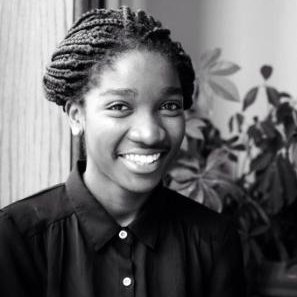
Last summer, Clark University’s Delight Gavor ’16, of Accra, Ghana, received funding and support from Clark’s LEEP initiative to implement a program she co-designed to help 36 truant youth discover and explore their talents in journalism, musical theatre, recycled art, and other areas, and apply those talents to solve problems in their community. This summer, a $10,000 grant from Davis Projects for Peace is enabling Gavor to share her successful “Butterfly Effect Program,” and incorporate it into a year-long curriculum for 200 eighth grade students in the Anyaa Community School in Ghana.
“Imagine if these youth who find they bear the brunt of underdevelopment do not see education as pivotal to their success, so most do not even show up for school regularly and instead get involved in truant activities. This is a reality for about a thousand students who attend under-resourced government schools in Ghana,” wrote Gavor in her proposal.
Gavor reported that last year her “Butterfly Effect Program” helped 36 students explore their interests and discover what they were good at (apart from academics), and encouraged them to use their interests to become socially responsible and solve community problems they identified themselves.
“This, to me, is my picture of peace,” Gavor wrote in her proposal.
This summer, Gavor is partnering with INTED (Institute of Teacher Education and Development) Africa and the Ghana Education Service to train the instructors who will be teaching the curriculum in the fall. Training will continue through August 14.
If the experience proves successful, Gavor will be allowed to share the curriculum with at least three other schools in the district in 2016, and possibly with the entire school district in the future.
“I have had the privilege of working with Delight on this project since her first year at Clark, so for three years, watching her vision for the Butterfly Effect develop,” said Seana Moran, research assistant professor in Clark’s Frances L. Hiatt School of Psychology.
“Delight has the passion, determination, creativity, and skill to make positive ripple effects in society. She not only aims to instill in others the courage and talents to ‘be the change you want to see in the world,’ she epitomizes that mantra,” said professor Moran. “I am thrilled that Clark and the Davis Foundation are supporting her worthy efforts.”
Gavor is a member of the Class of 2016 at Clark; she majors in psychology with a double minor in management and entrepreneurship. She is a 2012 graduate of the SOS Hermann Gmeneir International College in Tema-Ghana.
Other Clark students who have received funding from Davis Projects for Peace in the recent past include: Sanjiv Fernando ’15 in 2014 for his self-designed conservation project “Mitigating the Human-Leopard Conflict in Southeast Sri Lanka;” Melat Seyoum ’15 in 2013 for “The YWCA Critical Dialogue Program in Addis Ababa, Ethiopia;” Bonginkhosi (Petros) Vilakati ’13 in 2012 for “Recycling for Peace-Swaziland;” the late Amanda Mundt ’13 in 2011 for “Lekol Dete for Restavek and Free Children in Les Cayes;” Anuj Adhikary ’10 and Joseph Kowalski ’10 in 2010 for “The Energy for Education Project;” and Chelsea Ellingsen ’10 in 2009 for her project “Seeds of Change.”
Davis Projects for Peace invites all undergraduates at the 91 American colleges and universities which are partners in the Davis United World College Scholars Program to compete for these grants. A total of 184 students participating in 127 projects received funding this summer.
Beginning in 2007, on the occasion of her 100th birthday, international philanthropist Kathryn W. Davis chose to celebrate by committing $1 million to Projects for Peace. Now in its seventh year, the Davis Projects for Peace continue to support and encourage today’s motivated youth to create and test their own ideas for building peace.
